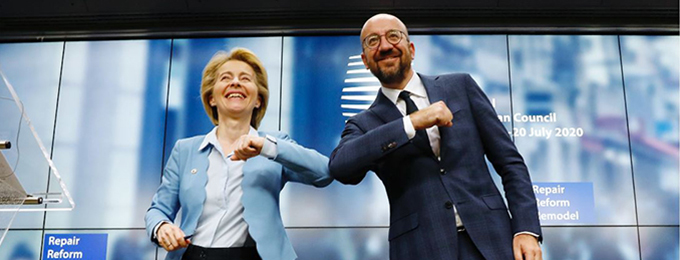The European Council’s budget compromise includes cuts for research, innovation and education compared to the Commission’s proposal, creating strong resistance.
Less than a month into the German Presidency, the EU Member States managed to craft a compromise on the EU’s multiannual financial framework (MFF) for 2021-2027 and the recovery instrument Next Generation EU (NGEU). In the morning of 21 July, on the fifth day of negotiations, the Heads of States or Governments reached a deal: The European Council agreed on EUR 1074.3 billion for the next MFF, only slightly below the European Commission’s (EC) late May proposal of EUR 1100 billion. The recovery instrument of EUR 750 billion remained in place as originally proposed. The leaders decided, however, that only EUR 390 billion, instead of EUR 500 billion, would be available as grants to Member States that were hit hard by the corona-caused economic crisis. The so-called four frugal countries, Austria, Denmark, Sweden and the Netherlands were joined by Finland in their successful request to increase the share of what will be made available as loans. The Member State’s compromise constitutes the largest budget in the EU’s history. It is the first time that the EU would borrow money on financial markets – as planned in order to fund NGEU.
Despite the only slight reduction of the MFF and the maintenance of the overall funding level for NGEU, the compromise would affect the research, innovation and education programmes substantially. Horizon Europe would receive only EUR 80.9 billion (incl. EUR 5 billion from NGEU), compared to the EC’s May proposal of EUR 94.4 billion that included EUR 13.5 billion from NGEU (always in 2018 prices). The Erasmus+ Programme, according to the Member States’ compromise, would receive EUR 21.2 billion, down from EUR 24.6 billion in the EC’s May proposal – or even 20% less than in the original EC proposal from 2018. The Digital Europe Programme’s (DEP) budget would be lowered to EUR 6.761 billion (compared to EUR 8.194 billion in the EC’s recent proposal). Also, InvestEU, Euratom and the EU Space Programme would see substantial reductions, alongside the nuclear fusion project ITER.
The outcome of the negotiations led to consternation and critical reactions among the research, innovation and education community. European umbrella associations reacted in disbelief to the Member States’ budget priorities in the midst of a pandemic, given the need for digital transition investments, and in the face of climate change and Europe’s goal to become carbon neutral by 2050. University associations call on the European Parliament (EP) to reverse the European Council compromise, especially when it comes to Horizon Europe and Erasmus+ budgets. The European Universities Association (EUA) commented that “Horizon Europe has been one of the victims of difficult negotiations, effectively becoming a ‘reserve fund’ to cut from in order to grant higher rebates to some countries”. Science Europe notes that “The Research and Innovation (R&I) sector has been sacrificed in these budget negotiations”. And, the European Association of Research and Technology Organisations (EARTO) in its press release referred to the challenge of the corona-caused economic downturn, stating that “coming out of the economic crisis due to the health pandemic cannot be done without RD&I investments”.
It took the European Parliament only two days to turn the widespread criticism into action and object to the European Council’s MFF and NGEU deal as it stands, clouding a too optimistic view on the Member States hard-fought compromise. On 23 July, the EP adopted by a large majority of 465 votes against 150, with 67 abstentions, a resolution, calling on Member States to reverse course on the cuts in their MFF agreement. Or else, the EP would not be able to agree to the EU’s next budget. Thus, the EP has stopped the momentum of the deal on the next MFF and the recovery instrument. The text of the EP resolution will also serve as a mandate in the upcoming negotiations between the institutions.

